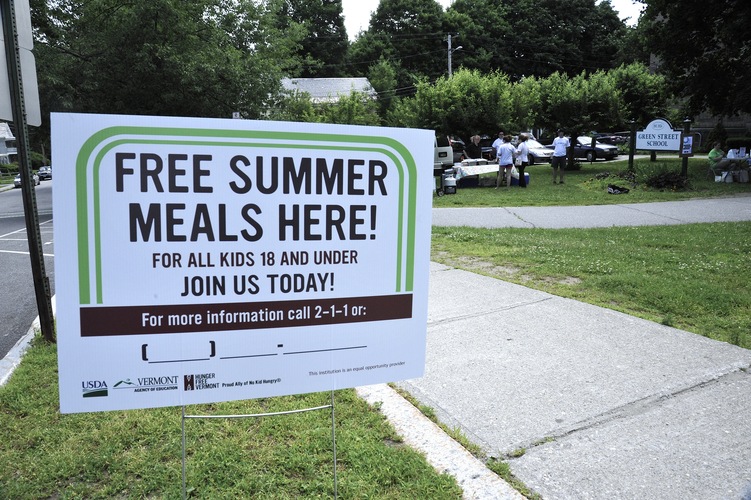Elayne Clift (elayne-clift.com) has written this column about women, politics, and social issues from the earliest days of this newspaper.
Remember the outcry when we realized that prior Republican administrations, national and state, cared about children but only from conception to birth? It's looking like déjà vu all over again with millions of children in this wealthy country going hungry.
As The New York Times noted in a January article, more than eight million kids in 13 states are about to be denied a federal food assistance program meant to help families in need during the summer months when school is out. States needed to opt into the program, one that had been approved by Congress with bipartisan support, by the start of this year.
Thirty-five states, as well as U.S. territories and tribal nations, signed onto the Agricultural Department program that would provide free or subsidized lunches to more than 20 million children in need of nutritional support. Twenty-two of them were led by Democratic governors and 13 by Republican governors.
The states that didn't sign on cited concerns about administrative costs; some had some weird ideological views or a lack of faith in the federal government.
This is happening in the face of a rapidly increasing poverty rate in this country that has begun to affect not just the poor but the middle class, with housing and rental costs rising while housing assistance falls.
All of this affects struggling families, and their children, especially immigrant kids, a rapidly growing cohort who don't deserve to go hungry.
It should also be noted that the WIC program, which helps women, infants, and children with supplemental nutrition, is at risk thanks to conservative members of Congress.
* * *
Vermont, which has a Republican governor, is one of the states that have declined to participate in the federal program. The state's Department for Children and Families told The New York Times that the requirements for the federal program were "very detailed and expensive," adding that it also wants to provide "this important summer nutrition benefit" next year, with the caveat that the state had the necessary funds to run the program and the technology to support it.
If that's not talking out of both sides of the mouth, I don't know what is.
According to vermontpublic.org, Vermont decided not to take part in the food assistance benefits of a program this year that U.S. Department of Agriculture calls "a tested and effective strategy for ending summer hunger" because of administrative costs, even though the federal government would pay for 100% of the cost of supporting families in the state - over $3 million - that would be sent to Vermont families under the program.
But Miranda Gray, deputy commissioner of of the Child Development Division of the Department of Children and Families, was upset that the USDA would cover only 50% of administrative costs. She did not cite what those costs might entail or the amount that would be required this year for half of the administrative costs.
Again, we heard political speak: "Vermont is very committed to doing this ... thoughtfully and correctly," referring to an inadequate IT system and "budgetary pressure."
* * *
Needless to say, numerous advocates for children and nutrition assistance programs are up in arms, although the organization Hunger Free Vermont backed the state's decision not to participate in the program this summer, underscoring the poor technical infrastructure, and applauding employees who performed "heroically" during pandemic-era food assistance programs.
Hunger Free Vermont's executive director, Anore Horton, declined to answer a few questions I sent her after she did not respond to a requested interview.
So, yeah - in hard times people with a conscience work hard. But where are the state's priorities?
Have the governors who declined to participate in this federal program never looked in the eyes of hungry kids, anywhere? Have they ever been hungry themselves, even for a short time? As a New York Times columnist noted in a recent op-ed, "The cruelty of it is almost incomprehensible."
According to charitable food organizations there has been a dramatic increase in demand for nutrition and food programs across the country. Many of the states that opted out of this summer program have extremely high poverty rates and have also refused to extend Medicaid for the poor, further challenging the health status of children.
* * *
Here's the fundamental question: Do we really care fervently about fetuses, but not living, breathing, hungry, and possibly sick children? Where is America's conscience? Can a policy decision that reduces child hunger be that hard?
Has complacency overtaken compassion in this country rich in resources? (Building fewer weapons of war to send abroad could go a long way toward solving this particular problem.)
Do affluent politicians and policymakers find it that easy to look away from other people's pain? Americans once worked hard to help win a war; can't we do so again to win the war on poverty and hunger?
Where is the will of the nation to commit to the human rights of real children?
Just think about that when you put your own kids to bed with a full tummy night after night.
This Voices column was submitted to The Commons.
